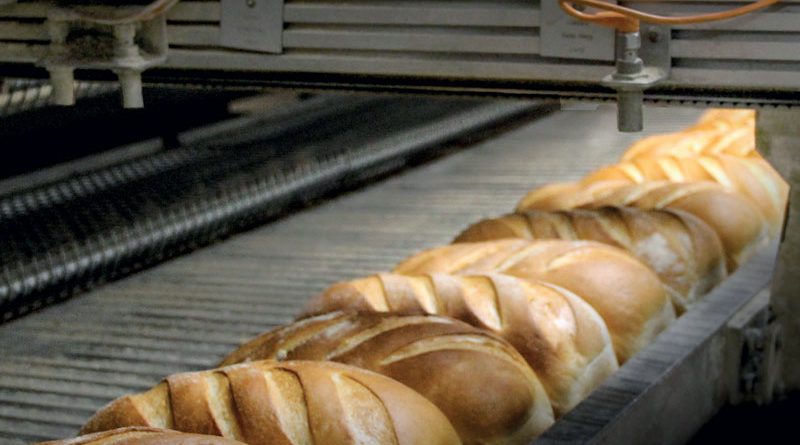Advanced Automation in Bread Production
HepcoMotion’s actuators provide a low maintenance solution in heavy duty applications such as bread manufacturing. British bread producer David Wood Foods use HepcoMotion’s DLS4 belt driven actuator system in its fully automated production line. Each system comprises belt-driven linear modules, an AC motor/inverter package and a range of compact planetary gearboxes for use with servomotors.
In recent weeks, due to the coronavirus pandemic, there has been a spike in demand for bread far in excess than previously seen. Whereas many people usually buy a ready-made lunch every day, now they are buying bread and eating at home. The UK bakery market is one of the largest markets in the food industry, and not surprisingly, there is a high need for modern technology to rise up to market demands. To keep up with today’s demand, the food processing industry needs to be efficient; this means most of the tasks need to be automated. But in every automated system, there are a host of smaller components that perform simple yet essential processes. Without these components, the automation could not take place.
In a fully automated production line, reliability is a must
Based in Newport, South Wales, David Wood Food manufacture bread for the biggest retailers in the UK. Operating a fully automated production line, from the initial weighing and mixing of ingredients, to the proofing, baking and cooling, right through to the slicing and packaging, David Wood Foods currently produce in excess of 420k loaves a week. Operating 24/7, 364 days of the year (Christmas day being the only non-operating day), this is a high duty system requiring a low maintenance, reliable solution. In addition to this bread manufacturing site, there are a further seven David Wood sites throughout the UK manufacturing luxury meals, savoury pastries, pasties and crafted bread. A mature and fiercely competitive market, David Wood Foods operate highly efficient manufacturing sites to stay a step ahead of the competition.
Actuators are essential elements of production lines in the food industry
Actuators are often essential elements of a production line in the food industry and for David Wood Foods this is no exception.
In this high duty application, David Wood Foods use HepcoMotion’s DLS4 belt driven actuator system which comprises belt-driven linear modules, an AC motor/inverter package and a range of compact planetary gearboxes for use with servomotors.
Corrosion resistant options are also available, very often a key requirement in the food and packaging industry where regular wash/wipe downs are frequently required. HepcoMotion specializes in high quality linear solutions and automation components that require low maintenance. Its products are distributed in Italy by Mondial Group, which has been distributing motion transmission components for 70 years.
A total of ten actuators are used in the application
A total of 10 x DLS4s are used in three key areas of the production line. Two are used to push the loaves into the oven, four are used as an infeed and outfeed in the cooler, and the final four are used in the packaging area to assist with packing the loaves into the delivery baskets. Ideally suited to this application, DLS4 is a reliable, low maintenance solution offering trouble-free operation from proven V guide technology and a long system life.
Arranged in parallel and operating with a single motor, the first set of DLS4s are connected to a pusher arm which moves the trays of loaves forward onto a conveyor, into the oven operating at a temperature of over 200°C. Working in close proximity to the oven, the double row bearings are suited to the high temperatures. HepcoMotion also offers Vacuum and Extreme Temperature bearings for either extreme high temperatures or extreme low temperature applications. 32 loaves are moved at a time and baked in the oven for over 20 minutes. The actuators are constantly repeating this process every 30 seconds, 24 hours a day, seven days a week. As a zero backlash system, the DLS4s are able to offer the greater repeatability and accuracy required for this application. After the loaves have baked in the oven, they are transported to the cooler where they spend 2 hours rotating on a cooling rack. Cooling is a key part of the bread manufacturing process to prevent the bottom crust becoming moist and soggy. David Wood Foods have approximately 9kg of loaves in the cooler at one time. Working in parallel with a single motor and attached to a pusher arm, one set of DLS4s push 22 loaves onto the rack, while the other set of actuators push the loaves from the rack onto the conveyor to get transported to slicing and packaging.
Customization ensures the highest flexibility
Another advantage with Hepco’s DLS4s is that they can be specified to a bespoke length to the nearest mm, up to 8m as standard. This offers customers greater flexibility as they can specify the stroke length to suit the production line, rather than having to design around a standard stroke length. This was an advantage for David Wood Foods as they could easily have variable stroke lengths to suit the different processes the DLS4s are used for. Hepco’s DLS modules can also be supplied as joined sets to fulfil longer stroke requirements.
A self-cleaning action against breadcrumbs and other particles
As with all food industry applications, the resulting breadcrumbs and dust at David Wood Foods creates a hostile, challenging environment. If particles of dirt and debris find their way beyond the seals of any linear motion component, or if they become damaged, the system will become jammed and motion will be impeded. This can result in catastrophic failure, meaning excessive downtime, and a complete system change. DLS4, however, is ideally suited to this harsh environment thanks to its V guide system that functions on the basis of tight geometrical control over matching slide and bearing V’s. In turn this provides a wiping action that expels debris, keeping machines running and reliable. This self-cleaning action eliminates contamination of the slide, a key benefit for David Wood Foods working with extensive breadcrumbs.
As small, but central parts of an enormous production system, low maintenance is a core requirement of these actuators. If one part of the system goes down, the entire production line is affected. With a high throughput of 420k loaves a week, any unplanned maintenance is going to have a big impact.
The challenge: low maintenance and minimal downtime
A big advantage of Hepco’s V guide systems is that they have long re-lubrication intervals. Saving valuable downtime and cost, Hepco’s cap seals need re-lubricating every 1,000 km, compared to every 100-150km with ball rails. These long re-lubrication intervals work well for David Wood Foods, dovetailing with their monthly planned maintenance schedule. In the last 12 months, re-lubrication is the only maintenance that David Wood Foods have had to carry out on the DLS4. Low maintenance cap seals are used to constantly lubricate the system and to provide effective sealing and protection. David Wood Foods require minimal downtime and servicing to achieve continuous operation. When a DLS4 shows sign of wear, the process is simple and does not impinge too much on production time. The eccentric adjustment facility of the V bearings can be used to quickly and simply remove any play that has occurred. Moreover, when the V bearings reach the end of their calculated life, they can be replaced individually, and not as an entire set, saving both time and money. The DLS4s have been in operation for nearly 10 years and the bearings have never been changed.

